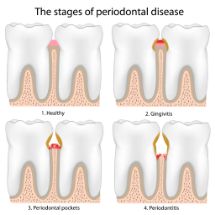 Did you know that an estimated 65 million adults in the U.S. have some form of gum disease? You may not spend much time thinking about your gums, but the truth is that they’re incredibly important to both your smile and general health. In this blog, you’ll learn how healthy gums also keep your body healthy and how a dentist can help you prevent or manage gum disease. With this information, you can maintain your smile and lower your risk of many serious diseases at the same time!
Did you know that an estimated 65 million adults in the U.S. have some form of gum disease? You may not spend much time thinking about your gums, but the truth is that they’re incredibly important to both your smile and general health. In this blog, you’ll learn how healthy gums also keep your body healthy and how a dentist can help you prevent or manage gum disease. With this information, you can maintain your smile and lower your risk of many serious diseases at the same time!
How Does Gum Disease Affect Your General Health?
Gum disease damages the gums and underlying jawbone that support the teeth and keep them in place, which is why it’s the leading cause of tooth loss.
As if that weren’t bad enough, it also causes chronic inflammation of the gums that can spread throughout the rest of the body, including the brain and the heart. Researchers think this is why it increases the risk of:
- Heart disease
- Stroke
- Pregnancy complications
- Dementia and Alzheimer’s disease
- Diabetes
- Some cancers
What Are the Signs and Symptoms?
Gum disease is similar to high blood pressure or diabetes because it’s a “silent disease” that doesn’t cause pain until later stages. But there are still warning signs to keep an eye out for.
In the first stage (called gingivitis) you may notice tender, swollen, or bleeding gums. More advanced symptoms include severe bleeding, chronic bad breath, a bad taste in your mouth, loose teeth, or pus under the gumline.
How Can You Prevent or Manage Gum Disease?
Many people with gum disease don’t know it, so the first step is scheduling regular checkups, which include an annual gum evaluation. If you currently have healthy gums or simply gingivitis, regular cleanings and good oral hygiene will usually prevent gum disease altogether.
However, if you’re diagnosed with more advanced gum disease, a dentist will typically start by recommending a procedure called scaling and root planing (also called a “deep cleaning”) to keep it from progressing.
This procedure thoroughly removes the tartar and bacteria under the gumline and smooths the roots to prevent bacteria from re-accumulating. It’s usually done in 2-4 appointments and you’ll be numbed first to make sure you’re comfortable throughout.
Afterward, a dentist will put you on a maintenance schedule of professional cleanings every 3, 4, or 6 months, depending on your needs. They’ll also give you tips for maintaining your gum health in between visits.
Because there’s such a strong mouth-body connection, your gums affect your overall well-being in many ways. But with regular dental care and a few good oral hygiene habits, you can minimize the risks and maintain your health for many years!
About the Author
Dr. Christel Cochell is a family dentist with nearly 15 years of experience and a graduate of the Oregon Health Sciences University School of Dentistry. She understands the importance of healthy gums to overall wellness and focuses on early diagnosis and treatment to help patients prevent gum problems as much as possible. If you have any questions or concerns about your gums, she can be reached via her website.
